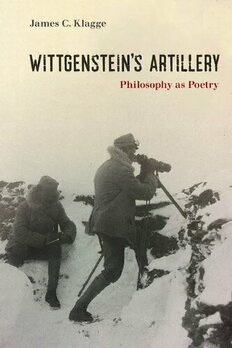
Wittgenstein's Artillery: Philosophy as Poetry PDF
Preview Wittgenstein's Artillery: Philosophy as Poetry
Wittgenstein’s Artillery Wittgenstein’s Artillery Philosophy as Poetry James C. Klagge The MIT Press Cambridge, Massachusetts London, England © 2021 The Massachusetts Institute of Technology All rights reserved. No part of this book may be reproduced in any form by any electronic or mechanical means (including photocopying, recording, or information storage and retrieval) without permission in writing from the publisher. The MIT Press would like to thank the anonymous peer reviewers who provided comments on drafts of this book. The generous work of academic experts is essential for establishing the authority and quality of our publications. We acknowledge with gratitude the contributions of these otherwise uncredited readers. This book was set in Stone Serif and Stone Sans by Westchester Publishing Services. Library of Congress Cataloging-i n- Publication Data Names: Klagge, James Carl, 1954– author. Title: Wittgenstein’s artillery : philosophy as poetry / James C. Klagge. Description: Cambridge, Massachusetts : The MIT Press, [2021] | Includes bibliographical references and index. Identifiers: LCCN 2020036778 | ISBN 9780262045834 (hardcover) Subjects: LCSH: Wittgenstein, Ludwig, 1889–1951. | Wittgenstein, Ludwig, 1889– 1951— Literary style. Classification: LCC B3376.W564 K533 2021 | DDC 192—dc23 LC record available at https:// lccn . loc . gov / 2020036778 publication supported by a grant from The Community Foundation for Greater New Haven as part of the Urban Haven Project I don’t try to make you believe something you don’t believe, but to make you do something you won’t do. — Ludwig Wittgenstein, 1931 I believe I summed up where I stand in relation to philosophy when I said: one should really only do philosophy as poetry. — Ludwig Wittgenstein, 1933 or 1934 Quite different artillery is needed here from anything I am in a position to muster. — Ludwig Wittgenstein, 1947 Contents Preface ix Abbreviations xi Introduction: Wittgenstein at War 1 1 Wittgenstein and His Audience 7 2 Wittgenstein and His Students 25 3 Wittgenstein at Work 37 4 Wittgenstein’s Methods and Aims 53 5 Wittgenstein and Poetry 69 6 Wittgenstein’s Poems 89 7 Doing Philosophy as Poetry 145 Notes 161 Bibliography 229 Index 249 Preface In this book, I tell a story about how Ludwig Wittgenstein (1889–1 951) came to care about the impact of his ideas on his students and readers and how he tried a “poetic” style of doing philosophy that could lead to the kinds of changes he sought. Although he did not ultimately think he was successful using this style, I examine various examples of this poetic style of writing that might serve Wittgenstein’s purposes. This is what I call Wittgenstein’s “artillery.” In writing this book, I have drawn on and significantly expanded earlier publications. Chapter 1 is based on “Wittgenstein and His Audience: Eso- tericist or Evangelist?” in N. Venturinha, ed., The Textual Genesis of Wittgen- stein’s Philosophical Investigations (Routledge, 2013, pp. 52–6 4). Chapter 2 is based on “Wittgenstein and His Students: 1929–1 933,” in D. Stern, ed., Wittgenstein in the 1930s: Between the Tractatus and the Investigations (Cam- bridge University Press, 2018, pp. 109–1 22). Chapter 3 is based on “Witt- genstein, Frazer and Temperament,” in Lars Albinus, Josef G. F. Rothhaupt, and Aidan Seery, eds., Wittgenstein’s Remarks on Frazer: The Text and the Mat- ter (de Gruyter, 2016, pp. 233–2 48). I thank the editors and publishers for permission to draw on these works. In each case I have found a good deal to add. Chapters 5 and 6 were given trial runs at the Seventh and Eighth Regional Working Conferences on Wittgenstein, held in Morgantown, West Virginia, in October 2016, and Lexington, Virginia, in April 2018, respec- tively. I owe a great deal to this loyal band of Wittgenstein fans who live in my region of the country. Finally, I thank Nadia Hijab for permission to quote from her father’s unpublished work. I thank three anonymous referees from MIT Press, as well as those who have commented on earlier versions of particular chapters or the whole
